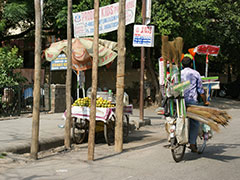Motivation
In the early 2000s, the Asian Development Bank (ADB) and USAID supported IFPRI’s implementation of the South Asia Initiative, aimed at addressing the region’s persistent problems of poverty and hunger using policy research, capacity strengthening, and policy dialogues. As one part of the initiative, IFPRI created the Policy Analysis and Advisory Network for South Asia, which included 50 top scholars, policy advisors, and policymakers from six countries (Bangladesh, Bhutan, India, Nepal, Pakistan, and Sri Lanka) who prioritized issues for research in the region. The Initiative also included two capacity-strengthening components: (1) the exchange of researchers between IFPRI and collaborating institutions, and (2) training workshops to strengthen policy analysis and communications.
Outcomes
The South Asia Initiative became a platform for research and analysis addressing the emerging policy challenges facing the food, agriculture, and natural resource sectors. Research studies funded through the South Asia Initiative helped to generate evidence while collaborative studies improved the capacity of the researchers, and policy dialogue based on the research helped mobilize action related to globalization—including World Trade Organization negotiations, trade policy analysis, food markets, input subsidies, and adoption of genetically modified crops. Initiative members continuously shared information on problems and solutions at the national and regional levels to improve the lives of people across Asia.
The South Asia Initiative provided a platform to build a common language and understanding of the research problems and questions for policymakers in the member countries. The research emphasized the role of the private sector in procuring and distributing agricultural commodities, the advances of institutional and pricing reforms for major agricultural input markets and subsidies, and the diversification into higher-value agriculture for smallholders.
- IFPRI provided technical assistance primarily to Bangladesh and Pakistan through the Policy Analysis and Advisory Network for South Asia. An ADB evaluation found that the technical guidance helped create centers of excellence for agricultural policy research and establish memoranda of understanding outlining future cooperation in agricultural policy research and capacity building.
- In India, then-leader of the opposition in Parliament and member of the Network, Dr. Manmohan Singh (now India’s prime minister) asked the Initiative to conduct a policy dialogue for the Indian parliamentarians on globalization and the World Trade Organization and their impact on Indian agriculture.
- The Initiative focused on capacity building in the developing countries by having local researchers lead the research projects, visit IFPRI as collaborators for extended periods of time, and subject their research publications to IFPRI’s rigorous review process. Many of them now play key roles in policy research in their home countries.
- As part of the activities of the South Asia Initiative, IFPRI published several books, including The Dragon and the Elephant: Agricultural and Rural Reforms in China and India, which investigates the reasons for China and India’s accomplishments in agriculture and rural development, and the lessons that can be applied both to other developing nations and to the problem of poverty that remains in these two countries. Following the book, IFPRI and the Jawaharlal Nehru University (New Delhi) and the Chinese Academy of Agricultural Sciences (Beijing) organized two international conferences, which brought together many prominent Chinese and Indian scholars and policymakers.



